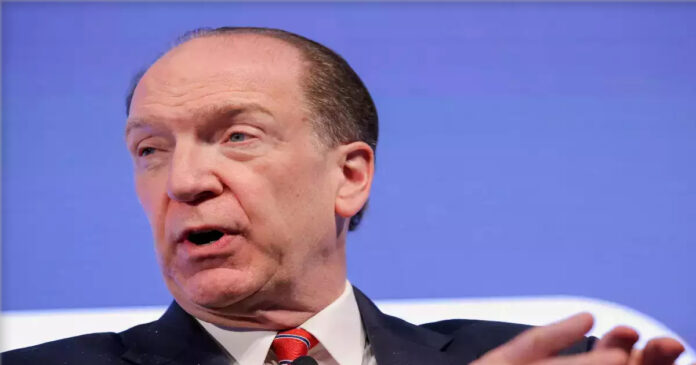David Malpass, the head of the World Bank, has announced he will retire almost a year early, completing a career that was marred by concerns over his stance on climate change.
The American Republican administration veteran, who had previously served as under secretary of the treasury for foreign affairs, was appointed to the position in 2019 when Donald Trump was president.
During his time there, the World Bank dealt with major crises like the COVID-19 epidemic, the Russian invasion of Ukraine, and a global economic slump.
The 66-year-old told the bank’s board of directors of his decision and was cited as stating, “After some consideration, I’ve chosen to seek new challenges.”
As the Bank Group works to address the growing global problems, there is a chance for a seamless leadership transfer, Malpass continued.
Malpass has faced calls for his resignation or dismissal in recent months.
After Malpass’ attendance at a conference hosted by the New York Times last September, the chorus of climate activists calling for his resignation got louder. They accused him of taking an insufficient approach to the climate problem.
Malpass refused numerous times to declare if he thought that man-made emissions were warming the globe, saying instead, “I’m not a scientist,” when pressed on stage to react to a charge made by former US vice president Al Gore that he was a climate denial.
Later, he clarified his position and indicated he had no plans to step down, admitting that emissions that contribute to global warming are produced by human activity, including burning fossil fuels.
The White House previously criticised Malpass, with Press Secretary Karine Jean-Pierre noting that the bank was expected to take the lead in responding to the climate catastrophe on a worldwide scale.
rapid response
In a statement released on Wednesday, the bank claimed that it had “responded swiftly” to recent global challenges, mobilising a record $440 billion to address crises including climate change, the pandemic, and others.
In the release, it was noted that “during (Malpass’s) leadership, the Bank Group more than doubled its climate finance to developing nations, reaching a record $32 billion last year.”
“Developing nations around the world are confronting unprecedented challenges,” Malpass wrote in a memo to workers that AFP was able to view. “I’m delighted that the Bank Group has continued to respond with speed, size, innovation, and impact.”
Originally, Malpass’s term was scheduled to expire in 2024.
His departure was welcomed by environmental groups.
Friends of the Earth tweeted, “Under David Malpass, the @WorldBank squandered crucial time in addressing climate change.”
Malpass fought for Wall Street-friendly policies that go against the interests of the general public, in addition to failing to stop activities that promote climate disaster and injustice.
“US Treasury Secretary Yellen seeks new World Bank president to continue multilateral development work”
The world has benefited from his steadfast support for Ukraine, his efforts to help the Afghan people, and his dedication to assisting low-income nations achieve debt sustainability through debt reduction, according to a statement from Treasury Secretary Janet Yellen.
She continued by saying that the United States anticipates a prompt nomination procedure by the World Bank board for the group’s next president.
“We will put forth a candidate to lead the World Bank and expand on the Bank’s longstanding work,” she added. “This candidate will carry forward the crucial work we are conducting to transform the multilateral development institutions.”
The chief of the other significant international lender in Washington, the International Monetary Fund, is often a European, whereas the head of the World Bank has historically been an American.
Malpass frequently criticised the large development lenders as wasteful and ineffectual and campaigned for reforms prior to taking the helm as president of the World Bank.

